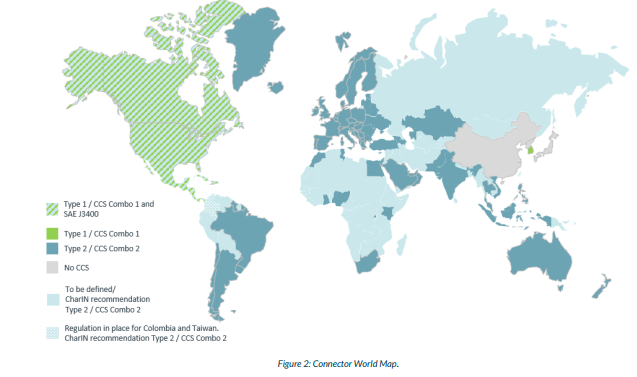The 38th International Electric Vehicle Symposium & Exposition
Harmonizing EV Charging Connectors: CharIN’s Commitment to Global Standards
Publication date: 19 December 2024
As the e-mobility market rapidly grows worldwide, a key challenge is harmonizing charging infrastructure. CharIN addresses this by promoting the Combined Charging System (CCS) as the universal standard for battery electric vehicle (BEV) charging including SAE J3400.
CharIn focuses on advancing CCS standards and certifying CCS-based products to ensure a seamless charging experience across borders and vehicle types.
CharIN is a non-profit organization open to any company involved in e-mobility with the goal is to define requirements for the evolution of CCS standards and the certification of CCS-based products.
CCS supports a wide range of charging powers and voltages, making it adaptable to the evolving EV landscape, from passenger cars to heavy commercial vehicles.
A key part of CharIN’s mission is to harmonize charging connectors across regions. For example, Europe uses the Type 2 / CCS Combo 2 connector, while North America relies on Type 1 / CCS Combo 1, with SAE J3400 expected to gain traction in the coming years. Brazil has adopted CCS Combo 2, while Mexico and nearby countries still use CCS Combo 1 and are expected to transition to SAE J3400 gradually. Moreover, there are specific markets, e.g. Colombia and Taiwan, where the regulation stipulates the installation of CCS, but the decision for CCS 2 or CCS 1 is not yet final.
To illustrate the regional similarities and differences, CharIN has developed a Whitepaper recommending a harmonized connector approach per geographical region to facilitate cross-border EV travel and enhance the global EV market uptake, where inconsistent charging systems currently hinder adoption.
For those countries that still use a mix of connector types and want to move to a harmonized approach, the use of appropriately OEM-designed &-tested adapters will be essential in the interim to enable compatibility and interoperability without compromising safety or user experience.
CharIN recommends a harmonized connector approach per geographical region as outlined in the below map:

Arguments for CCS Combo 2 as single connector for many markets (except USA/NA) CCS
Combo 2 is technically superior to CCS Combo 1 and SAE J3400, because of the fundamental 3-phase support which allows interoperability between countries in the region, regardless of the grid phase configuration.
Beyond the safe distinction of the safe distinction of the safe distinction of AC and DC charging, CCS Combo 2 handles charging voltages of up to 1,000 V and currents exceeding 400 A. and has the state of the art communication viand has the state-of-the-art communication via ISO 15118, which allows advanced features like vehicle-to-grid (V2G) and vehicle-to-home (V2H), paving the way for future innovative energy systems.
Megawatt Charging System (MCS): A single connector for all markets
In addition to CCS, CharIN is leading the development of the Megawatt Charging System (MCS) for commercial vehicles requiring rapid, high-power charging. MCS is designed to deliver several megawatts of power, drastically reducing charging times for heavy-duty vehicles, such as trucks, buses, and maritime and aerospace applications.
With solid backing from both the US and EU governments, MCS is poised to become the global standard for heavy-duty EVs. It addresses the need for efficient charging of high-demand vehicles while offering a future-proof solution that will meet the growing energy needs of commercial transport and logistics.
Accelerating Global EV Adoption
CharIN’s efforts to harmonize charging standards are crucial for speeding up global EV adoption. By promoting CCS Combo 2 and MCS, CharIN ensures EV drivers can charge their vehicles quickly and safely, regardless of location. Harmonized standards also reduce costs for manufacturers and infrastructure providers, simplifying the development of charging networks and lowering the cost of entry for emerging markets.
As regions like Latin America, Southeast Asia, and others continue to develop their EV infrastructure, CharIN’s work will help guide the creation of consistent, scalable systems. This will make it easier for countries to integrate electric vehicles into their energy ecosystems and support the growth of electric mobility across borders.
Conclusion
CharIN’s focus on standardized charging infrastructure is vital for advancing electric mobility. By promoting CCS Combo 2 for passenger vehicles and developing MCS for heavy-duty, marine and aerospace applications, CharIN is driving the adoption of a universal, future-proof charging system. These standards enhance safety, interoperability, and scalability for the global EV market.
At EVS38, CharIN will showcase its progress, highlighting how harmonized standards can shape the future of e-mobility. CharIN’s members, with their collective efforts, are moving the industry toward a seamless, efficient EV charging ecosystem accessible to all regions.